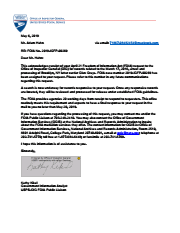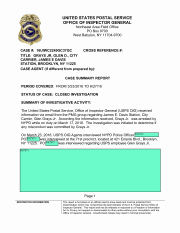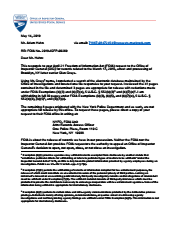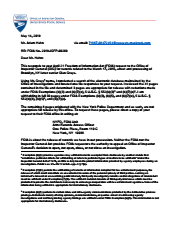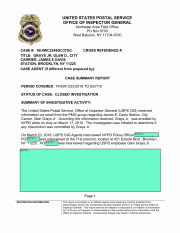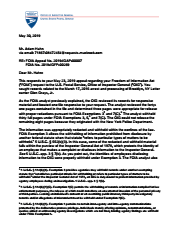Glen Grays Arrest, Prosecution, and Investigation (United States Postal Service, Office of Inspector General)
| Tracking # |
2019-IGFP-00269 |
| Multi Request | Glen Grays Arrest, Prosecution, and Investigation |
| Submitted | April 16, 2019 |
MuckRock users can file, duplicate, track, and share public records requests like this one. Learn more.
Communications
From: Adam Hahn
To Whom It May Concern:
Pursuant to the Freedom of Information Act, I hereby request the following records:
All records relating to the March 17, 2016 arrest and processing of Brooklyn letter carrier Glen Grays.
All records relating to the prosecution and dropping of charges against Mr. Grays.
All records relating to subsequent investigations of the arrest, including the arresting officers and supervisors, any administrative action taken as a result of the investigation, and the disposition of the investigations.
“Arrest of Postal Worker in Crown Heights.” YouTube, DNAinfo New York, 22 Mar. 2016, www.youtube.com/watch?v=3jDDs-CzF5E.
“Charges against Postal Worker Arrested by NYPD Dropped.” CBS News, CBS Interactive, 12 May 2016, www.cbsnews.com/news/charges-against-postal-worker-arrested-by-nypd-dropped/.
“Video of Questionable Arrest of on-Duty Letter Carrier Sparks Outrage, Concern.” The Postal Record, vol. 129, no. 5, May 2016, pp. 4–5., www.nalc.org/news/the-postal-record/2016/may-2016/document/2016-05_arrest.pdf.
The requested documents will be made available to the general public, and this request is not being made for commercial purposes.
In the event that there are fees, I would be grateful if you would inform me of the total charges in advance of fulfilling my request. I would prefer the request filled electronically, by e-mail attachment if available or CD-ROM if not.
Thank you in advance for your anticipated cooperation in this matter. I look forward to receiving your response to this request within 20 business days, as the statute requires.
Sincerely,
Adam Hahn
From: United States Postal Service, Office of Inspector General
Dear Mr. Hahn:
Please find attached my acknowledgement of receiving your FOIA request.
Sincerely,
Kathy Kikel
Government Information Analyst
USPS-OIG FOIA Public Liaison
From: United States Postal Service, Office of Inspector General
Dear Mr. Hahn:
Please find attached my final response to your FOIA request.
Sincerely,
Kathy Kikel
Government Information Analyst
USPS-OIG FOIA Public Liaison
From: Adam Hahn
Freedom of Information Act Appeal
Ms. Griffith,
I’m writing to appeal the response to FOIA № 2019-IGFP-00269 written by Ms. Kikel on 2019-05-24. I received two documents, which are attached to this correspondence: 2019-IGFP-00269 Hahn, Adam Final Determination (describing the contents released and the fact that 30 full pages were withheld) and Case #16UIWC2249GC37GC Release (three pages of a heavily redacted document). I appeal the withholding of 30 full pages and the redactions in the 3 pages released. I group my grounds for appeal by FOIA exemption.
Materials Withheld under Exemption 3 (30 Full Pages and Redactions on the 3 Pages Released)
Exemption 3 exempts from disclosure matters “specifically exempted from disclosure by statute . . . if that statute . . . establishes particular criteria for withholding or refers to particular types of matters to be withheld . . . .” 5 U.S.C. § 552(b)(3). The statute cited as supporting withholding the materials was Pub.L. № 95–452, section 7(b). 2019-IGFP-00269 Hahn, Adam Final Determination, p. 1; Case #16UIWC2249GC37GC Release, p. 2. That section states that “[t]he Inspector General shall not, after receipt of a complaint or information from an employee, disclose the identity of the employee without the consent of the employee, unless the Inspector General determines such disclosure is unavoidable during the course of the investigation.”
I appeal because only the identity of the reporting employee could possibly be withheld under Exemption 3, as that’s all Pub.L. № 95–452 § 7(b) describes an Inspector General disclosing. This doesn’t at all support withholding 30 full pages of documents. All materials outside of the reporting employee’s identity are outside the scope of materials the statute protects.
Please review and release the the 30 pages of withheld documents and unredact the redactions in the 3 redacted pages.
Materials Withheld under Exemption 5 (30 Full Pages)
Exemption 5 exempts from disclosure “inter-agency or intra-agency memorandums or letters that would not be available by law to a party other than an agency in litigation with the agency.” 5 U.S.C. § 552(b)(5). The FOIA defines “agency” as “any executive department, military department, Government corporation, Government controlled corporation, or other establishment in the executive branch of the Government (including the Executive Office of the President), or any independent regulatory agency.” 5 U.S.C. § 552(f)(1).
I appeal because this definition applies only to federal authorities, not state agencies, including, for example, the NYPD.
Please review the materials withheld and release any correspondence with non-federal agencies.
For the any remaining material the USPS OIG withholds due to Exemption 5, please explain precisely why Exemption 5 applies.
Materials Withheld under Exemption 7(C) (30 Full Pages and Redactions on the 3 Pages Released)
Exemption 7
Exemption 7 exempts from disclosure “records or information compiled for law enforcement purposes,” subject to further requirements. 5 U.S.C. § 552(b)(7).
Before addressing subsection (b)(7)(c), I first appeal on the grounds that these materials were not compiled for federal law enforcement purposes, and thus outside the purview of Exemption 7.
Not every document compiled by a federal law enforcement agency satisfies the law enforcement purpose inquiry Exemption 7 requires. See Am. Immigration Council v. U.S. Dep’t of Homeland Sec., 950 F.Supp.2d 221, 245–46 (D.D.C. 2013) (rejecting ICE’s argument that all of its records are compiled for a law enforcement purpose (citing Pratt v. Webster, 673 F.2d 408, 419 (D.C. Cir. 1982)); Benavides v. Bureau of Prisons, 774 F.Supp.2d 141, 146-47 (D.D.C. 2011) (rejecting a “per se” rule that all BOP documents are created for law enforcement purposes and finding that BOP’s recordings of inmates’ telephone conversations fell outside of law enforcement purposes (citing Pratt, 673 F.2d at 416)). Instead, the withheld records “must be related to the enforcement of federal laws.” Pinson v. U.S. Dep’t of Justice, 236 F.Supp.3d 338, 364 (D.D.C. 2017).
The records at issue here, however, were created as a result of an investigation into potential violations of New York state law (the purported disorderly conduct), not federal law. See Case #16UIWC2249GC37GC Release, p. 1. (“According the information received, Grays Jr. was arrested by NYPD while on duty on March 17, 2016.”)
Further, the case summary report states that this “investigation was initiated to determine if any misconduct was committed,” not violations of law. Case #16UIWC2249GC37GC Release, p. 1. This type of monitoring was taken to “insure compliance with the agency’s statutory mandate and regulations,” which is not covered by Exemption 7. Stern v. FBI, 737 F.2d 84, 89 (D.C. Cir. 1984).
Please review and release the the 30 pages of withheld documents and unredact the redactions in the 3 redacted pages.
Exemption 7(C)
Assuming arguendo that the materials satisfy the federal law enforcement purpose inquiry, Exemption 7(C) exempts from disclosure federal law enforcement records “only to the extent that the production of such law enforcement records or information . . . could reasonably be expected to constitute an unwarranted invasion of personal privacy.” 5 U.S.C. § 552(b)(7) and (b)(7)(c).
I appeal for multiple reasons.
First, I appeal on the grounds that any “invasion of personal privacy” has already occurred. The actions taken against the NYPD officers involved have already been made public. A timely news article states the identities of the four NYPD employees involved: Lt. Luis Machado and officers Lazo Lluka, Miguel Rodriguez and David Savella. Murray Weiss, NYPD Lieutenant Who Oversaw Arrest of Mailman Stripped of Gun and Badge, DNAInfo, Apr. 1, 2016, https://www.dnainfo.com/new-york/20160401/crown-heights/nypd-lieutenant-who-oversaw-arrest-of-mailman-stripped-of-gun-badge/. It also describes some of the disciplinary actions taken against the officers for their breach of public trust: “The NYPD lieutenant involved in the questionable arrest of a Brooklyn mailman was stripped of his gun and badge Thursday and placed on desk duty” and “Lt. Luis Machado and officers Lazo Lluka, Miguel Rodriguez and David Savella were grilled by NYPD investigators.” Weiss, supra.
In deciding whether the release of particular information constitutes an “unwarranted” invasion of privacy under Exemption 7(C), one “must balance the public interest in disclosure against the [privacy] interest Congress intended the Exemption to protect.” U.S. Dep’t of Justice v. Reporters Comm. for Freedom of the Press, 489 U.S. 749, 776, 109 S.Ct. 1468, 103 L.Ed.2d 774 (1989). There is generally a diminished privacy interest in information that is already publicly available. Am. Civil Liberties Union v. U.S. Dep’t of Justice, 655 F.3d 1, 12 (D.C. Cir. 2011). As much of this purported invasion is already publicly available through the reporting above, the material should be released, as the public interest in disclosure outweighs this diminished interest.
Second, I appeal because no facts were stated explaining why releasing these materials would cause harassment, intimidation, or physical harm to come to any of the subjects, the materials must be released.
Merely having government employees involved doesn’t create a privacy interest surmounting the public interest in favor of disclosure. “Simply put, if the government's bare assertion that a protected privacy interest is involved . . . is sufficient, then the FOIA privacy exemptions could effectively swallow the general rule favoring disclosure.” Stonehill v. Internal Revenue Serv., 534 F.Supp.2d 1, 12 (D.D.C. 2008).
A case involving the USPS OIG, in fact, explains the prerequisites to invoking Exemption 7(C). “[A]n agency must at least explain the ground for concluding that there is some factual basis for concerns about ‘harassment, intimidation, or physical harm.’ But the OIG declarations set forth no factual basis to support any concerns of harassment, intimidation, or physical harm.” United Am. Fin., Inc. v. Potter, 667 F.Supp.2d 49, 60 (D.D.C. 2009) (citation omitted).
In that case, the redactions at issue were the names of the USPS OIG investigators involved, which the District Court for the District of Columbia determined must be released. Here, however, vast majorities of entire paragraphs are redacted under Exemption 7(C). That is, the allegedly privacy-invading matter isn’t even present in the released materials, let alone the investigators’ names. United America Financial controls and states that both should be released, since no basis for concluding harassment, intimidation, or physical harm would occur has been given.
For the foregoing reasons, please review and release the the 30 pages of withheld documents and unredact the redactions in the 3 redacted pages.
Finally, for any materials not released, provide specifics of why this exemption is applicable, including the grounds for concluding there is a factual basis for concern of harassment, intimidation, or physical harm, as required by law.
Thank you,
Adam Hahn
From: United States Postal Service, Office of Inspector General
Dear Mr. Hahn:
Please find our final response to your FOIA appeal.
Files
pages
